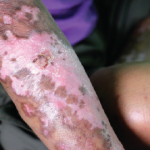“Especially in the midst of the COVID19 pandemic,” he says, “long-term treatment with rituximab may not be welcomed by both physicians and patients.”
Dinesh Khanna, MD, of Michigan Medicine, University of Michigan, Ann Arbor, coauthor of a related editorial, comments in an email to Reuters Health. “These data are different than recently published large international trials where the researchers have seen marked heterogeneity in the mRSS (despite standardization of mRSS) and [this] has led to negative trials.
“An example includes the recently published phase 3 trial of tocilizumab in early systemic sclerosis where 210 patients were randomized to either weekly tocilizumab or placebo for 52 weeks,” he says. “The primary outcome measure was mRSS, which was statistically non-significant, but tocilizumab showed clinically meaningful effect on lung function, which led to the FDA approval of tocilizumab for SSc-related interstitial lung disease.”2
“To provide confidence in the [current] trial, the researchers should plan a well-designed international trial with standardization of end points and include clinically meaningful end points such as forced vital capacity, and composite end points such as ACR CRISS score before rituximab can be advocated for treatment of early SSc with progressive skin involvement,” Dr. Khanna concludes.
The study was funded in part by Zenyaku Kogyo. No competing interests were declared.
References
- Ebata S, Yoshizaki A, Oba K, et al. Safety and efficacy of rituximab in systemic sclerosis (DESIRES): A double-blind, investigator-initiated, randomized, placebo-controlled trial. Lancet Rheumatol. 2021 May 26. Online first.
- Khanna D, Lin CJF, Furst DE, et al. Tocilizumab in systemic sclerosis: A randomized, double-blind, placebo-controlled, phase 3 trial. Lancet Respir Med. 2020 Oct;8(10):963–974. Epub 2020 Aug 28.

